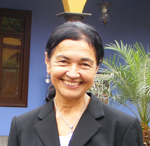Ruth Shady
Ruth Shady | |
|---|---|
 Shady in 2014 | |
| Born | Ruth Martha Shady Solís December 29, 1946 Callao, Peru |
| Nationality | Peruvian |
| Occupation(s) | Anthropologist and archaeologist |
| Known for | First extensive documentation of the Norte Chico civilization |
| Awards | BBC's 100 Women 2020 |
Ruth Martha Shady Solís (born December 29, 1946, Callao, Perú) is a Peruvian anthropologist and archaeologist.[1] She is the founder and director of the archaeological project at Caral.[2][3]
Career
[edit]Throughout her career, she has directed many different projects of archeological investigation on the coast, the highlands and the rain forests of Peru, placing emphasis on the study of the development of the complex socio-political organizations. She was director of the Museo Nacional de Arqueología y Antropología del Perú (National Museum of Archaeology and Anthropology of Peru), and director of the Museum of Archeology and Anthropology of National University of San Marcos. She has worked at the Caral site from 1994 onwards and is credited with the discovery of Norte Chico, the first known civilization of the Americas, and one of the oldest in the world. Shady has named the civilization after Caral, while the term Norte Chico has been adopted in English.
In 2001, Shady and others published radiocarbon dates from the site of Caral in the Supe Valley of Peru, indicating that monumental corporate architecture, urban settlement, and irrigation agriculture began in the Americas by 4090 years before the present (2627 calibrated years B.C.) to 3640 years before the present (1977 calibrated years B.C.). Caral is located 23 kilometers (14 miles) inland from the Pacific coast and contains a central zone of monumental, residential, and nonresidential architecture covering an area of 65 hectares (160 acres). Caral is one of 18 large preceramic sites in the Supe Valley.[4][5]
Shady holds the offices of President of ICOMOS-PERU, principal professor and co-ordinator of the master of archeology graduate program faculty of social sciences of the University of San Marcos and director of the special archeological project Caral-Supe/INC.
Awards
[edit]
Shady was on the list of the BBC's 100 Women announced on 23 November 2020.[6]
References
[edit]- ^ Atwood, Roger. "A Life Story". Long Island City, New York: Archaeology Magazine, June 13, 2016.
- ^ Miller, Kenneth. "Showdown at the O.K. Caral: Archaeologists have an uncivilized fight over how civilization began in the Americas". New York, New York: Discover Magazine, September 9, 2005.
- ^ Yuhas, Alan. "Discovery of 4,500-year-old female mummy sheds light on ancient Peru". London, United Kingdom: The Guardian, April 23, 2016.
- ^ Solis, Ruth Shady, Jonathan Haas and Winifred Creamer. "Dating Caral, a Preceramic Site in the Supe Valley on the Central Coast of Peru". Washington, D.C.: Science, Vol. 292, No. 5517, pp. 723-726, April 27, 2001.
- ^ "Caral: Oldest City in the New World: An Interview with Dr. Ruth Shady" (audio), on "The Archaeology Channel". Eugene, Oregon: Archaeological Legacy Institute, July 30, 2001.
- ^ "BBC 100 Women 2020: Who is on the list this year?". BBC News. 23 November 2020. Retrieved 23 November 2020.
External links
[edit]- Shady Solís, Ruth Martha (1997). La ciudad sagrada de Caral-Supe en los albores de la civilización en el Perú. Lima: UNMSM, Fondo Editorial. Retrieved 3 March 2007. (in Spanish)
- Ruth Shady e Instituto de Salud del Niño obtienen Premios Campodónico 2007 June 15, 2007 (in Spanish)
- Ruth Shady - An open letter to Jonathan Haas and Winifred Creamer: http://caralperu.typepad.com/caral_civilization_peru/2005/01/open_letter_fro.html
